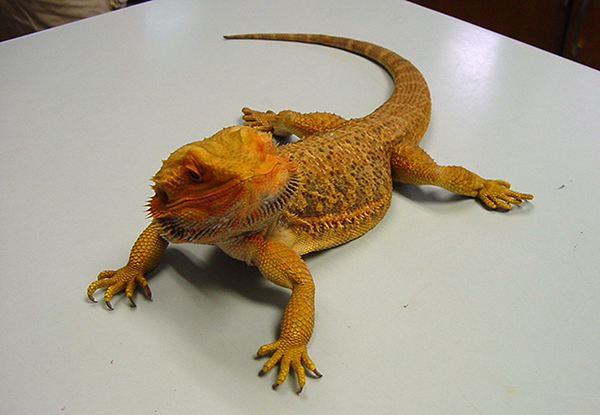Inland or Central Bearded Dragon
Inland or Central Bearded Dragon
Pogona vitticeps

Printable Care Sheet
Explore More!
General Information
Family: Agamidae
Locale: Australian central deserts
Habitat: Semi-arid to arid woodland and rocky desert
Average Size: 16 - 22 in. long
Average Life Span: 5-8 years
Activity: Diurnal, semiarboreal
Care Summary
Captive care: ≥ 20 gal aquarium (larger better), 40 gal breeder tank for pair; substrate: sand, (under tank heat pad), driftwood, shelter, basking light, screen cover (can be loose), shallow water dish big enough to soak in. Avoid putting hatchling dragons on sand until they are about 4" SVL (snout-vent-length). Some breeders prefer bare bottom tank or paper towel as bedding. Mist hatchlings daily (a light misting, then wipe the cage clean and dry before first feeding).
Temperature: 76 (cool end) - 86˚F (24-30˚C) with basking 90-100˚F (32-37˚C); drop to 70˚F at night. Hatchlings especially need high belly temperatures to assist digestion.
Lighting: Full spectrum light (need UVB) & incandescent for heat
Foods: crickets (calcium/vitamin dusted), mealworms, dubia roaches, pinky mice (occasionally), super worms, finely chopped greens or mixed veggies. Age specific instructions:
0-2mos.: feed 2-3x/day; 1/8 – 1/4" crickets (dusted 1x/day)
2-4mos.: feed 2x/day; 1/2" crickets (dusted 1x/day), salad every other day
4mos - mature: feed once/day; crickets, mealworms, roaches, super worms, salad every day
adult: feed every 1-2 days; crickets (dust 2 feedings/week ), super worms, roaches, pinky mice (occasionally), dark leafy greens (e.g., Romaine lettuce, red-leaf lettuce) every day
Juveniles can be voracious eaters, feed small numbers of crickets at a time, but continue to add crickets until lizard stops eating - can eat 20-30 crickets at a feeding. Cricket length should be about the distance between the lizard’s eyes.
Temperament: Docile enough to hold and very interactive, great pets.
References
References:
Bartlett, P.P., Griswold, B., Bartlett, R.D. (2001). Reptiles, Amphibians, and Invertebrates, an identification and care guide. Barron’s Educational Series, Hauppauge, NY. 279pp.
Bearded dragon. (2003). Received from http://www.lihs.org/files/caresheets/P_vitticeps.html
de Vosjoli, P., Mailloux, R. (1993). General Care & Maintenance of Bearded Dragons. Advanced Vivarium Systems, Inc. Lakeside, CA 92040.
de Vosjoli, P., Mailloux, R. (1996). A simple system for raising juvenile bearded dragons (Pogona) indoors. The Vivarium 7: 42-43.
de Vosjoli, P., Mailloux, R., Donoghue, S., Klingenberger, R., Cole, J. (2001). The Bearded Dragon Manual. Advanced Vivarium Systems, Inc. Irvine, CA. 174pp.
Kaplan, M. (2014). Received from http://www.anapsid.org/bearded.html
Sprackland, R. (1994). Australia’s Bearded Dragons. Reptiles 1(6):44-53.
Range Map: http://www.environment.gov.au/biodiversity/abrs/online-resources/fauna/afd/taxa/Pogona_vitticeps
Compiled by Eileen Underwood. Updated 8/2016.
The Herpetarium is a facility in the Department of Biological Sciences.
Bowling Green State University | Bowling Green, OH 43403-0001 | Contact BGSU Herpetarium | Campus Map
Updated: 02/13/2023 01:43PM

